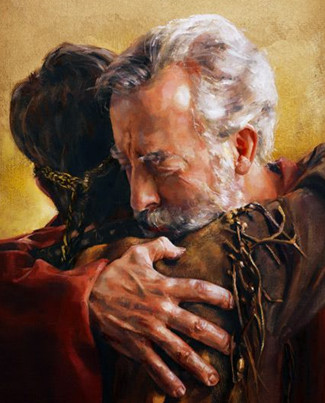It doesn't take much to remind us of the terrible destruction that flows from anger: wounded hearts, broken homes and families, ruined relationships and shattered lives. Anger so often leads to hatred and suspicion. It blinds our judgment. It festers, makes us petty and spiteful and destroys our peace of mind. Ultimately, it makes us morose and resentful, mistrusting and insecure.
 Anger is the raw material of cruel prejudice, of civil and national strife, of religious fanaticism and of terrorism and war.
Anger is the raw material of cruel prejudice, of civil and national strife, of religious fanaticism and of terrorism and war.
There is no more important lesson for us to learn as followers of Jesus than that of giving and accepting forgiveness - lovingly, totally, unconditionally. If we haven't learned that, we really haven't begun to learn the meaning of being Christian.
Letting go of anger, forgiving and being reconciled is the hallmark of the Christian. Jesus made a point of this over and over again in his discourses and parables. In response to Peter's question: "Lord, how often must I forgive, seven times?" Jesus answered: "No, seventy-times seven times!" Today's parable indicates clearly that unlimited forgiveness towards others must be motivated by God's unlimited mercy toward us. That's why He instructed us to pray: "Forgive us our trespasses as we forgive those who trespass against us."
This is a tough phrase to digest when every instinct in our nature cries out for vengeance at the sight of hatred and injustice. But justice is not based on vengenace. It is rooted in restorative forgiveness.
We may well respond by saying that we can forgive, but we cannot forget. The hurt lingers. The wound heals so slowly, if at all. I think Jesus knows how we think and feel. He is patient. In our struggle to let go and forgive, He will nurture His loving spirit within us. And whenever our anger rises up again, He will gently remind us that God has forgiven us our faults, our pride, and our selfishness. Again and again and again. He never grows weary. Neither must we.
Understanding this enables us to grow in our faith and in our relationships with one another. But It requires change. We move from one stage of our journey to another only by letting go of the past and letting go of our prejudices. This is indeed risky business. Many of us grew up believing that if we just followed the established norms and the status quo all would be well. Following Jesus goes much deeper than that. He challenges us to go out of our way to forgive. No matter how large the debt, no matter how often the transgression, no matter how terribly we have been hurt.
We must dig deeply into our souls and forgive. No matter what.
There can be no compromise when it comes to the message of Christ. If we buy into it only half-heartedly, we will ultimately lose it. If we pick and choose who we will forgive - and how often - we end up betraying the entire message of the Gospel. If we are faithful only when it is easy to be, we run the risk of denying Him under pressure. With Jesus, it's all or nothing. His invitation to follow is one that requires both courage and generosity. It requires the ability to accept forgiveness, and to give absolution.
It is precisely the challenge of forgiveness that keeps us fresh, alert, open, joy-filled and hope-filled. It is this that allows us to see clearly, and to understand that a faith which does nothing, that gives nothing, that costs nothing, that suffers nothing, that forgives nothing, is worth nothing.





